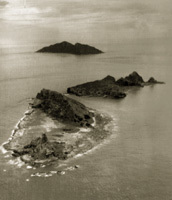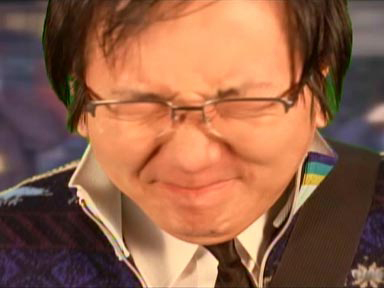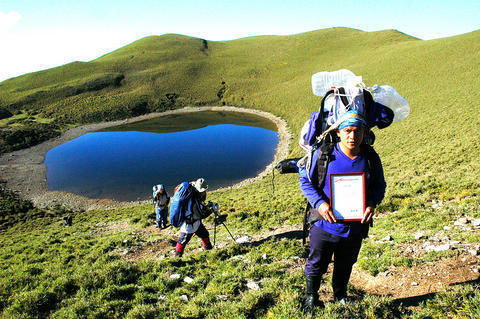Terrific set of editorials in Taiwan’s China Post on Monday – from a blogger’s point of view, anyways. Both deal with issues of Taiwanese sovereignty. The first, "Did Taiwan give up sovereignty over the Tiaoyutai Islands?" makes the case those islands belong to Taiwan rather than Japan, then takes the government to task for not pressing Taiwan’s claim assertively enough:
Taiwan’s Coast Guard Administration appears reluctant to confront Japanese patrols over the Tiaoyutai [known to the Japanese as the Senkaku Islands – The Foreigner], where Yilan* fishermen now often get caught for "intrusion" into Japanese "territorial waters." Activists have been forbidden to make any protest trips there…
You want an international incident…over THIS???

(Image from twhistory.org)
The second editorial, "What’s in a name?" ridicules President Chen Shui-bian’s efforts to have the country named "Taiwan" rather than "Taiwan, China":
[President Chen] is obsessed with the idea of getting Taiwan to accede to the United Nations under its rightful name. His government bristles whenever anything from Taiwan shown abroad is said to be from Taiwan, China.
That’s why the Government Information Office lodged a complaint with the organizers of the Venice Film Festival, who, under pressure from Beijing, listed Taiwan-produced films as entries from Taiwan, China. Among them was "Se Jie (Lust Caution)," directed by Ang Lee of "Brokeback Mountain" fame. It was originally described as a production from "USA and China" for it was shot in both countries. It was later changed to Taiwan at the request of its producer. That in turn drew complaints from China. Then the name was settled as "USA/China/Taiwan."
[…]
All this sounds like silly gags in a bad TV sitcom. Can’t we try just to forget whatever name other countries in the world choose to attach to our island nation? [emphasis added]
Ironically enough, the Post‘s conclusion is contradicted by the very example it provides. The Venetians didn’t "choose" to list Taiwan-produced films as originating from "Taiwan, China"; they were PRESSURED by Beijing into doing so – by the China Post‘s own admission.
Be that as it may, we’re still faced with the question: Is this, as the Post claims, just a silly semantic quibble? Isn’t the whole "Taiwan" vs. "Taiwan, China" vs. "Chinese Taipei" debate on par with arguments over tomayto-tomahto or Germany-Deutschland? Shouldn’t Taiwan just get a life and ignore trivialities?
What’s amusing is that a paper that spilt so much ink complaining about the renaming of Chiang Kai-shek Memorial Hall would have the face to turn around on a dime and subsequently ask its readers, "What’s in a name?" Let me guarantee you, the China Post wouldn’t be nearly so philosophical about that question if Tokyo started referring to Taiwan as JAPANESE-Taipei. Nosiree – the China Post would be the first to regard THAT as an attempt to de-legitimize Taiwan.
No Czech newspaper would nonchalantly ask, "What’s in a name?" if Berlin started talking about "Sudetenland, GERMANY" once more. Not if it didn’t want to appear treasonous, it wouldn’t. And papers in the Baltics wouldn’t give little sermons about semantic freedom if Vladimir Putin had pressured other countries into referring to Lithuania as RUSSIAN Vilnius.
No, in both cases, the Czechs and Balts would be swift to recognize their own self-interest. They’d instantly see those names as something sinister, as preludes to future attacks upon their national sovereignty.
Maybe now you can see why I was so impressed that the China Post printed both those editorials on the same page. Because recognizing that the second piece calls upon Taiwan to surrender its sovereignty in one arena, the writers compensated by defending it in another.
Now, I may be one of the world’s worst chess players, but even I know that as a general rule, the key to success in that game is to protect your important pieces, while sacrificing your unimportant ones. Yet, the China Post counsels the exact opposite. The Post would have Taiwan defend the sovereignty of the Senkakus – risking war through "confrontation" with Japanese patrols ** – over a relatively insignificant group of islands 7 square kilometers in size, on which not a single Taiwanese lives, or ever HAS lived. That, while ignoring Chinese threats to the sovereignty of Taiwan Island itself – an island 36,000 square kilometers in size and populated by 23 MILLION people.
There are only two possible conclusions here.*** Either those guys are even worse chess players than I am…or, this is a game they deliberately want Taiwan to lose.
* Yilan is a county on Taiwan’s north-east coast.
** A Taiwanese confrontation with Japan over the Senkakus risks war with not only Japan, but America herself:
The 1960 US-Japan Treaty of Mutual Cooperation and Security applies to territories under the administration of Japan, including the Senkaku Islands. In November 1996, Assistant Secretary of Defense Campbell stated that the basic position of the US is that the Japan-US security treaty would cover the Senkaku Islands. Secretary of Defense William Perry reconfirmed this fact on 03 December 1996.
A conflict is, perhaps, what the China Post hopes for. Stir up Chinese nationalist sentiment in Taiwan and provoke a war with Japan and its ally, America. Chinese nationalists then have their excuse to renounce America, and openly ally themselves with their communist brethren across the Strait. From twhistory.org:
But the fight for sovereignty of the Diaoyutai [Senkakus], even to the extent of debating Taiwan’s international position and legitimacy, has been continuously examined and contended, with some people [in Taiwan] even advocating a United People’s Republic of China, or so-called Overseas Chinese, fighting together for the sovereignty of the Diaoyutai… [emphasis added]
With the strategic goal of uniting Taiwan with the PRC accomplished at last, the victor in any war for the Senkakus’ would be largely besides the point.
*** Actually there is a third possibility. While as a general rule the good chess player protects valuable pieces and sacrifices weak ones, he sometimes does the opposite in order to BAIT his opponent. Parenthetical point #2 above represents an example of what this might look like.
The opponent in such a case would be none other than the Taiwanese people, who, if misled into taking the bait, would be lured away from a democratic ally and into the arms of authoritarian one.
i-1


